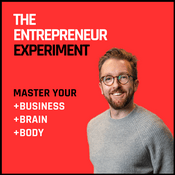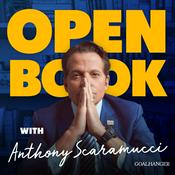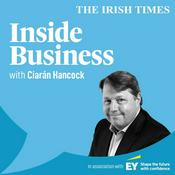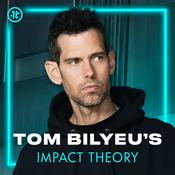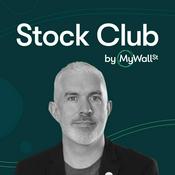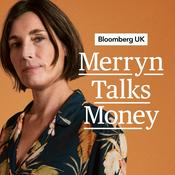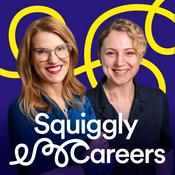44 episodes
- Episode 43: David Edwards — Cracking the Code on Strategic Workforce Planning
David Edwards has spent decades transforming strategic workforce planning from organisational afterthought into boardroom priority. Currently Head of Workforce Planning at Ericsson and founder of consultancy Dark Artistry, he's built SWP functions inside global enterprises including NatWest, where he created an internal mobility programme that saved over 500 roles from redundancy. His forthcoming book, The Strategic Workforce Planning Handbook (Kogan Page, January 2026), has earned endorsements from Dave Ulrich and David Green. In this conversation, he challenges conventional thinking about what SWP actually is—and crucially, what it isn't.
What We Cover
Why SWP Remains Reactive—and How to Change That
Edwards argues that for most organisations, SWP is still "a reactive process to the setting of budgets." The real opportunity lies in extending the window for workforce preparation—moving from crisis-mode redeployment to proactive talent readiness. At NatWest, this meant identifying at-risk employees months earlier, creating genuine career pathways rather than scrambling at redundancy notices.
Planning for Strategic Workforce, Not Whole Workforce
One standout from the recent SWP Conference was Roche's methodology: rather than planning for everyone, they focus on workforce segments that are strategically critical right now. Edwards adds a counterintuitive twist—declining workforce segments deserve equal attention, as they represent the talent pool for emerging demand.
Workforce Risk as the Underused Lever
With CEO tenures averaging seven years and remuneration tied to short-term results, long-term workforce stewardship gets squeezed out. Edwards suggests reframing around risk: "What is the risk the workforce poses to the successful execution of even short-term business strategy?"
The £50,000 Question: Reskilling vs Redundancy
Financial Services Skills Commission research shows reskilling saves nearly £50,000 per person compared to redundancy-and-rehire cycles. Yet most organisations default to firing. Edwards connects this to mental wellbeing—having been made redundant himself, he's passionate about proving there's a better way.
Key Quote
"It is not so much planning strategically for the whole workforce, but planning for the workforce which is at this moment in time strategic."
Practical Tips for SWP Practitioners
Start using labour market data immediately—it creates compelling stories that move business leaders.
Build multiple future scenarios rather than one fragile plan.
Focus on workforce segments critical to current strategy, including those in decline.
Frame workforce challenges as business risk, not HR administration.
What David is Working On
The Strategic Workforce Planning Handbook publishing 3rd January 2026 (UK)—pre-order at koganpage.com/SWPH
Launching Dark Artistry consultancy offering masterclasses and advisory retainers
Speaking at People Analytics World Zurich (February 2026)
About David Edwards
David Edwards is Head of Workforce Planning at Ericsson and founder of Dark Artistry Ltd. He previously spent over six years at NatWest building their strategic workforce management capability, and served as Advisory Services Director at Visier. A member of the Workforce Planning Institute's Global Standards Committee, he's a recognised speaker and mental health champion.
Resources Mentioned
Deloitte Insights: Is It Time to Break Workforce Planning Out of Its Silo?
McKinsey: HR's Transformative Role in an Agentic Future
Financial Services Skills Commission: Research on reskilling cost savings
Roche and Sade Benjamin (American Airlines): SWP Conference presentations
As ever—big thanks to our sponsors: https://lightcast.io - Tony Holly, Senior Director at Magnet's Strategic Advisory Team, joins the podcast to reveal the massive blind spot in most organisations' talent intelligence: contingent labour. Tony's team touches 600,000–800,000 contingent workers every single week across 600+ Fortune 500 clients. Despite this enormous scale, contingent workforce data remains largely invisible to strategic workforce planning—a gap that's costing organisations millions.
What We Cover
The Contingent Workforce at Scale - Large organisations manage 2,000–4,000 contingent workers weekly through 100+ staffing agencies. One pharmaceutical client had billions in professional services spend with no way to connect costs to quality outcomes. Time-to-fill averages 15 days but hits 53 in markets like New York, yet most organisations lack visibility into these metrics.
The Fatal Migration to SOW - Organisations systematically move contingent workers from staff augmentation (40% markup) to statement of work arrangements (70%+ markup) to circumvent headcount policies. Same worker, same work, same supplier—but a 30 percentage point premium. Tony calls this expensive policy avoidance masquerading as workforce strategy.
Redeployment as Competitive Advantage - Leading organisations maintain talent pools including recently completed assignments, silver medallists from permanent recruitment, and retired workers seeking short engagements. Technology matches historical quality scores, pricing data, and skills to new requisitions—eliminating onboarding friction since workers already have systems access and cultural knowledge.
Context Over Numbers - Tony's team contextualises data against benchmarks to identify red flags before they become crises. When five consecutive workers cite the same manager's attitude in exit feedback, that's not a data point—it's a leadership intervention waiting to happen.
Total Talent Intelligence Remains Elusive - Despite years of rhetoric, permanent and contingent workforces remain siloed. Magnet's "stage five visionary clients" achieve true total talent intelligence—mapping all workers in one view to answer strategically: should we build, borrow, or bot this capability?
Key Quote
"We've seen organisations pay 70% more to get around artificial headcount policies. They're paying 30 percentage points more to circumvent rules that are hurting the organisation and costing more money. Why do that?"
Practical Tips for TI Leaders
Consolidate all contingent workforce data immediately—dirty and unclean—then identify gaps rather than waiting for perfect data
Audit whether workers are moving to SOW to avoid headcount limits—you may be paying a 30-point premium
Build redeployment pools including completed assignments, silver medallists, and retired workers
Map contingent workers geographically and analyse metrics by location before making return-to-office decisions
Always provide context through benchmarks and identify red flags before they become crises
What Tony is Working On
Expanding total talent intelligence capabilities integrating FTE and contingent workforce data
Developing redeployment matching tools pairing skills, quality scores, and pricing history
Advising clients on the "fatal migration to SOW" and quantifying cost impacts
About Tony Holly
Tony Holly is Senior Director with Magnet's Strategic Advisory Team, leading 40+ business intelligence consultants globally. He supports 600 of Magnet's 700 clients—including 20% of the Fortune 500. With degrees in psychology, industrial-organisational psychology, and organisational development, Tony has spent over a decade building analytics capabilities in the contingent labour space.
As ever—big thanks to our sponsors: https://lightcast.io - Over three years after her first appearance (Episode 18), Kim Bryan returns to the Talent Intelligence Collective podcast to discuss her evolution from leading a global TI team of 120 at its peak to launching AMS's Research Lab. In this wide-ranging conversation, Kim shares insights from analysing around 400,000 hiring records spanning just under 100 countries from 2020 to 2025 and reveals what's really driving offer declines (spoiler: it's not always about money).
What We Cover
AI & Employment - Examining Stanford's "Canaries in the Coal Mine" study and why the "AI is replacing entry-level workers" narrative might be correlation, not causation. The real impact on software development and customer support roles, and why businesses still don't understand where to apply AI effectively.
ONS Labour Force Survey Crisis - UK response rates dropped from under 50% in 2016 to around 20% now, whilst the US maintains 68%. Critical national decisions are being made on inadequate data due to funding and skills mismatches.
Evolution of TI at AMS - How talent intelligence moved from "add-on service" to embedded across all client work. The shift to self-service models, introduction of Insights and Intelligence Partners, and the ongoing data literacy challenge.
Offer Declines Research - Key findings: 15% increase in time-to-hire when offers are declined. Compensation wasn't the dominant reason—personal factors, hiring process issues, and flexibility matter more than expected. Sales roles showed highest volatility; project management roles surprisingly volatile due to change management demand. The critical finding: recruiter-candidate relationships matter more than process automation.
Education Revolution - Oxford research showing AI sector prioritises skills over formal education. Why universities haven't fundamentally changed since post-Industrial Revolution, and the return of apprenticeships and practical training.
Key Quote
"Despite all of the tech advances and all of the different strategies you can apply, the biggest difference that you can make to your process is still through your people. Post-offer engagement can be the difference between an offer being accepted and being declined."
Practical Tips for TA Leaders
Give Yourself Creative Space - Stop firefighting long enough to actually plan ahead
Invest in Your People - Find time to develop your team, not just extract from them
Find Something Outside Work - Your professional performance depends on your personal wellbeing
Coming from AMS Research Lab
The Great Flattening (declining management layers)
Skills mismatch: Are universities preparing students for tomorrow's jobs? (publishing soon)
Stores to supply chains: How holiday hiring is changing
EU Pay Transparency Directive analysis
Industry deep dives and labour market overviews
Comprehensive TA metrics benchmarking (2026)
About Kim Bryan
Kim Bryan is the Global Head of Research at AMS, where she leads their Research Lab think tank. She's been with AMS for nearly 10 years in this stint (and worked there previously too, making it nearly two decades total). She previously looked after talent intelligence for AMS and managed a global team of 120 at its peak. Her varied career spans insurance and a mix of numbers and people work, making her ideally suited to the intelligence and insights space.
Resources Mentioned
AMS Research Lab Report: "Offer Declines and Dropouts"
Stanford Digital Economy Lab: "Canaries in the Coal Mine: Six Facts About the Recent Employment Effects of Artificial Intelligence"
Beyond the Buzz Report on AI Skills
Oxford Internet Institute & University of Oxford: Research on AI sector prioritising skills over formal education
Office for National Statistics Labour Force Survey
As ever - big thanks to our sponsors: https://lightcast.io - Welcome to Episode 40 of the Talent Intelligence Collective podcast! In this episode, Alan Walker, Alison Ettridge, and Toby Culshaw welcome Jen Allen Jardine, the self-proclaimed "SWP supergeek" and founder of Beyond the Eightball consultancy, who's currently bringing her strategic workforce planning expertise to HS2 after seven years of asking the uncomfortable questions that organisations need to hear.
The episode opens with Toby analysing the results of the Talent Intelligence Collective's One and Done Challenge, revealing how AI-generated talent intelligence reports can produce dangerously convincing visualisations whilst harbouring significant data hallucinations. The discussion highlights how tech talent consistently skews results regardless of the actual prompt, and the critical importance of human expertise in validating AI outputs—with Patricia's inclusion of visa lead times demonstrating the nuanced thinking that distinguishes expert analysis from algorithmic suggestions.
The news segment examines Saudi Arabia's remarkable skills week initiative, where they've mapped 8,500 skills across just 12 priority sectors as part of Vision 2030—a masterclass in national-level strategic workforce planning that prioritises focused action over comprehensive cataloguing. The conversation explores Mercer's Talent Trends report revealing that only 47% of employees believe their managers understand their skills gaps, whilst job-hoppers receive 16.4% salary increases compared to 5.6% for loyal employees—sparking debate about whether internal talent marketplaces or salary structures are the real retention culprit.
Jen shares her unconventional journey from a working holiday visa in New Zealand to becoming one of the UK's leading SWP practitioners, including her experiences with airline scheduling complexities that cross the international date line and staffing hard-to-fill hospitals in rural Invercargill. Her definition of strategic workforce planning challenges conventional thinking: it's not about timeline horizons but about connecting every people intervention across the business to deliver organisational purpose sustainably and effectively.
The conversation explores why organisations struggle with true strategic planning, with Jen arguing that both public and private sectors fail by seeking false certainty in an uncertain future. She advocates for scenario planning that embraces radical uncertainty—planning for multiple tomorrows rather than trying to predict a single future, using external market intelligence combined with internal knowledge to build organisational agility through constant iteration rather than perfect predictions.
The episode concludes with Jen's three essential tips for SWP success: secure a "badass sponsor" (preferably the CEO) who can drive organisational change, use data to identify and challenge real pain points rather than assumed problems, and critically, start small despite pressure for comprehensive solutions. Her insight that managers often don't understand their teams' skills connects directly back to the Mercer findings, demonstrating how data maturity and decision-making courage are more important than perfect information.
Until next time, stay agile, stay evidence-based, and most importantly, stay intelligent!
As ever - big thanks to our sponsors: https://lightcast.io - Welcome to Episode 39 of the Talent Intelligence Collective podcast! Alan Walker, Alison Ettridge, and Toby Culshaw are joined by Kumar Vaibhav, a seasoned TI professional who has built and led talent intelligence functions at Amazon, Walmart, Philips, and now Atlassian, bringing over 11 years of experience in transforming raw data into strategic workforce insights.
The episode begins with exciting news as Toby announces Lightcast's acquisition of Rhetoric, bringing 800 million profiles and 280 million company records to expand their people and company data capabilities. This strategic move represents a significant shift from aggregated TI data to actionable intelligence, bridging the gap between macro workforce planning and micro-level talent acquisition needs.
Drawing from his recent experience at RecFest, Toby explores how talent intelligence has become so embedded across HR functions that it no longer needs its own dedicated stage—TI is now the underlying foundation for everything from employer branding to skills intelligence. The conversation touches on the evolving landscape of AI implementation in recruiting, revealing that while efficiency gains are evident, true systematic automation remains limited.
Kumar shares his remarkable journey from founding a dramatics club at university to becoming a TI leader across some of the world's largest technology companies. His insights into building stakeholder rapport are particularly compelling—from his first project at Philips where he successfully convinced leadership to change their APAC headquarters location, to developing innovative approaches like using Power BI to analyse borough-level talent distribution in New York during the post-COVID workplace transformation.
The discussion delves into Kumar's unique perspective on building world-class TI functions from scratch, emphasising three critical elements: aligning with business strategy, demonstrating operational ROI alongside strategic value, and building credibility through transparency and stakeholder trust. His examples span from competitive intelligence in finance sourcing to innovative location strategies that consider both external market data and internal talent mobility patterns.
Kumar offers fascinating insights into the growing prominence of TI teams in India, explaining how the evolution from cost arbitrage to genuine skills development has created a thriving ecosystem of talent intelligence professionals. His candid revelations about working with Toby—including the memorable moment when Toby questioned whether TI truly adds value—provide both humour and profound insights into the self-reflection required in this evolving field.
The episode concludes with Kumar's excitement about joining Atlassian, where he's leveraging Confluence to build dynamic project repositories that double as internal databases, potentially revolutionising how TI knowledge is captured and accessed through AI-powered systems.
Until next time, stay curious, stay brilliant, and most importantly, stay intelligent!
As ever - big thanks to our sponsors: https://lightcast.io
More Business podcasts
Trending Business podcasts
About Talent Intelligence Collective Podcast
A podcast about all aspects of Talent Intelligence, Talent Research, Talent Analytics, Labor Intelligence, Human Capital Intelligence, Competitor Labor Intelligence. This is a sister podcast to the main Facebook group https://www.facebook.com/groups/talentintelligencecollective
Podcast websiteListen to Talent Intelligence Collective Podcast, The Entrepreneur Experiment and many other podcasts from around the world with the radio.net app

Get the free radio.net app
- Stations and podcasts to bookmark
- Stream via Wi-Fi or Bluetooth
- Supports Carplay & Android Auto
- Many other app features
Get the free radio.net app
- Stations and podcasts to bookmark
- Stream via Wi-Fi or Bluetooth
- Supports Carplay & Android Auto
- Many other app features


Talent Intelligence Collective Podcast
Scan code,
download the app,
start listening.
download the app,
start listening.


